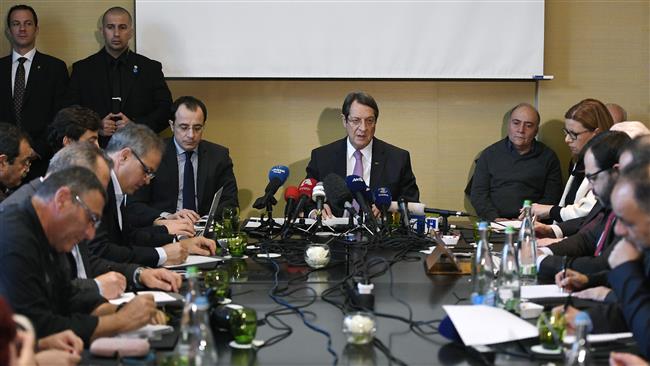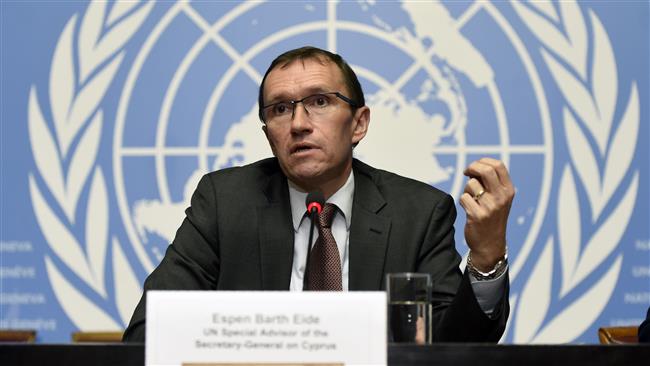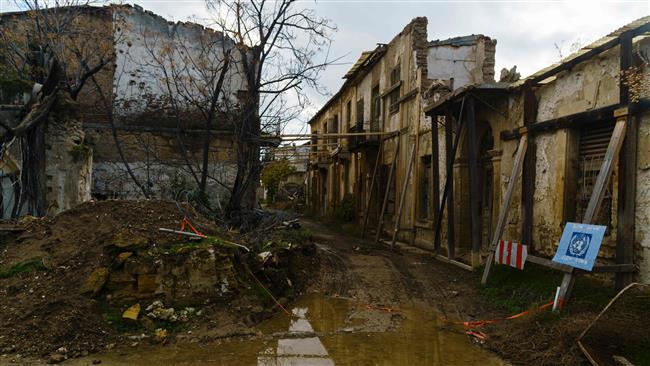Cyprus rival leaders ask UN to hold peace summit next month
The rival leaders of ethnically-split Cyprus has called on the United Nations to hold a follow-up peace summit early next month, after last month's negotiations were suspended over vast differences between the two sides, the world body says.
The Special Advisor to the UN Secretary-General on Cyprus, Espen Barth Eide, made the announcement on Wednesday, adding that the would-be summit is aimed at tackling the security arrangements following the reunification of the eastern Mediterranean island.
“The leaders requested the United Nations to prepare, in consultation with the guarantor powers [Britain, Turkey and Greece], for the continuation of the Conference on Cyprus at political level in early March,” Eide said.
He further noted in his statement that Turkish Cypriot leader Mustafa Akinci and Greek Cypriot leader Nicos Anastasiades also had reached an agreement to meet on a weekly basis throughout February to resolve outstanding issues.
Akinci and Anastasiades “underscored their strong resolve and determination to maintain the current momentum,” added Eide.
The pair along with their so-called guarantors met in Geneva, Switzerland, in January, in an attempt to reach a deal to end four decades of stalemate in the contested island. The summit, which was aimed particularly at weighing security guarantees, seen as vital to a reunification, however, ended inconclusively and proved that differences between the Turkish and Greek sides are too wide to bridge.

The island country has been divided since 1974 into a breakaway Turkish-speaking north and an internationally-recognized Greek-speaking south following an intervention by Turkey, which came when a brief military coup was carried out by individuals who sought to unify the island with Greece.
In 1983, Turkish Cypriots proclaimed an independent state, called the Turkish Republic of Northern Cyprus (TRNC), which has only been recognized by Ankara. Since then, peace efforts between the leaders of the two sides of the small island have helped slightly improve diplomatic relations, but a final solution remains impossible to achieve.
The UN has denounced the Turkish invasion of Cyprus, the ensuing occupation and the establishment of TRNC through a number of resolutions, which are reaffirmed by the UN Security Council every year.
Some 800,000 Greek Cypriots and approximately 220,000 Turkish Cypriots live on each side of the divided island split by a buffer zone patrolled by United Nations peacekeepers, where a “no man's land” full of abandoned homes, shops, hotels and other buildings lies empty.
BP to be sued in Britain for supplying oil to Israel
VIDEO | Press TV's news headlines
Israeli strikes on north Gaza hospital ‘extremely dangerous, terrifying’: Director
VIDEO | Yemen targets Tel Aviv with Palestine 2 missiles
Pezeshkian: Iran resolved to complete North-South Transport Corridor
VIDEO | Iran-Syria: For Resistance
Qassam Brigades claims killing 3 Israeli troops in northern Gaza
More alive than ever: Sayyed Hassan Nasrallah's legacy grows stronger in martyrdom














 This makes it easy to access the Press TV website
This makes it easy to access the Press TV website